The 2022 season is run, won and done – and none of us will be forgetting it anytime soon.
For reasons both on-field and off, the year ends on a bit of a sour note, with harrowing mid-week allegations of racism at Hawthorn combining with a heinously one-sided grand final taking some of the gloss off the myriad of thrilling finishes, exceptional drama and plethora of storylines that have made 2022 one of the finest footy seasons in living memory.
From picking apart the grand final, to casting our eyes ahead to 2023, to running our eyes over the soon-to-depart Gillon McLachlan’s time in charge of this game of ours, there’s simply too much to unpack for to not have one last Six Points for the road.
So, without further ado, let’s dive right in.
1. All the TV money in the world can’t fix Gill’s legacy
Gillon McLachlan departs as AFL CEO with the league richer than it’s ever been.
A monumental new television deal to confirm the AFL’s standing as Australia’s pre-eminent competition, means the code is now safe from the financial perils that threatened through the COVID years.
Had the accusations involving Alastair Clarkson and Chris Fagan remained under wraps, it’s likely navigating the game through the perils of 2020 and 2021, weathering the storm and coming out the other side stronger for it would be McLachlan’s defining legacy as CEO.
But instead, like predecessor Andrew Demetriou, the accusations levelled against Alastair Clarkson and Chris Fagan mean the defining image of his tenure will be of its biggest controversy. For Demetriou, it was the Essendon supplements saga, and his conduct therein: for McLachlan, it’s the presence of racism in the sport as a whole.
McLachlan’s final scandal at the helm mirrors his first: he ends with allegations of racism against celebrated and admired icons of the game, while he began with allegations of racism from celebrated and admired icons of the game.
There’s plenty of water to go under the bridge in the former, but McLachlan’s public comments since the scandal broke – namely committing to undertaking an investigation into the allegations rather than instigating any meaningful change or introspection, and then confirming that the review’s findings would remain in-house for the sake of anonymity – aren’t promising.
As it was with Adam Goodes nearly a decade ago, it seems the league is once again opting for damage control rather than attempting to address what caused the damage in the first place. Little wonder incidents of racism have pockmarked McLachlan’s reign from start to finish.
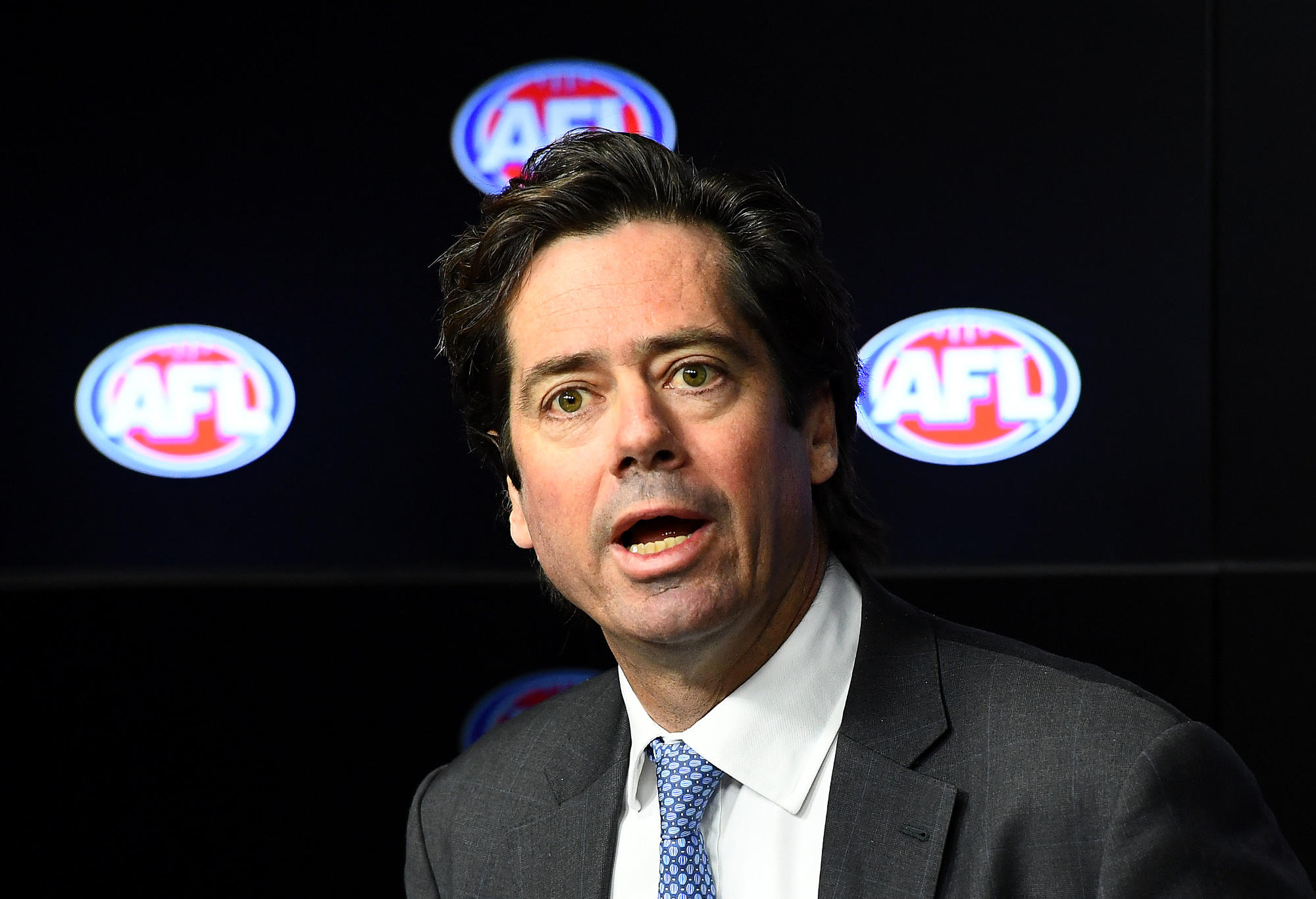
Gillon McLachlan (Quinn Rooney/Getty Images)
From being too slow and indecisive in response to Goodes being booed, to its handling of Taylor Walker’s racial slur last year, through countless examples of fan racism at games and all the way to Clarkson and Fagan, McLachlan and the league have failed to acknowledge an inevitable truth: the AFL has a racism problem.
Not every fan is racist, and not every fan who is being racist realises they are: many defend to this day booing Goodes for any number of trumped-up charges.
But at the bare minimum, there are far too many people associated with this game at every level, from officialdom to the players to the media to the public, that are like Eddie McGuire comparing Goodes to King Kong on Triple M in 2013: grossly ignorant of when indeed they have transgressed, and given no cause to reflect on it.
Putting aside whether Clarkson and/or Fagan are found guilty of the accusations levelled at them. The mere fact that a First Nations icon in Eddie Betts, an ornament to the game and someone who has experienced nearly every form of racial vilification one can receive, could be completely unsurprised by the allegations should tell you plenty just how prevalent racist attitudes still are in this game.
McLachlan has had many, many chances in his time in charge to finally admit that the AFL has a problem. He has sat on his hands, dithered, not wanted to offend those while they are in the midst of offending others, and tried to put out every spotfire that presents itself without even considering whether maybe they should be out looking for the arsonist first.
The league under McLachlan has been like that story of the man fishing dead animal after dead animal out of the river so the water isn’t contaminated. Eventually, his friend gets out of the river and starts walking upstream. When asked why, the friend tells him he’s going to see who’s throwing the dead animals into the water so he can stop them at the source.
Unless steps are taken at some point to try for a solution, accusations like those levelled at Clarkson and Fagan are going to keep coming to the surface. And the first step must be for whoever replaces McLachlan at CEO to, finally, admit that racism is entrenched without our game.
Only by doing this can we have any hope of stamping it out.
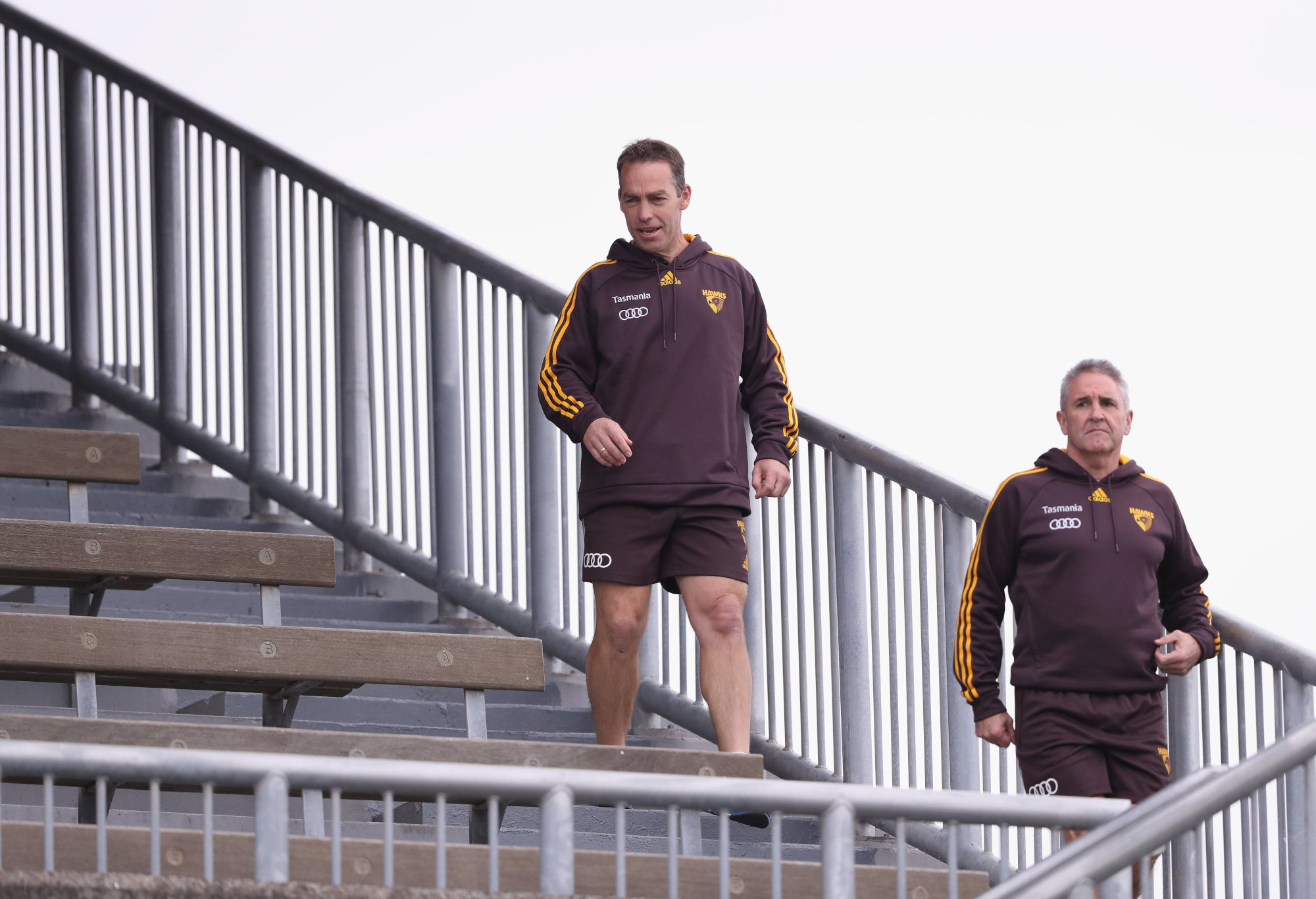
Alastair Clarkson and Chris Fagan at a Hawthorn training session in 2016. (Photo by Robert Cianflone/Getty Images)
2. Don’t blame Sam Reid for Swans’ grand final nightmare
Sam Reid wasn’t right, and it was clear from practically the first bounce.
Really, it was clear from the moment the Swans chose to bring Hayden McLean into their grand final 22, implicitly confirming that Reid simply wouldn’t be able to fulfil his usual role as second ruckman.
With just four touches, all handballs, a complete lack of influence and getting destroyed by Sam De Koning almost every time the ball went near him, it was a minor miracle the 30-year old made it to half time before being subbed out.
Even John Longmire could only admit the Swans erred in selecting an underdone Reid for the game.
“We were obviously confident, that’s why we picked him, but we made a mistake,” he said.
For many, Reid’s selection and performance, like GWS captain Phil Davis in the Giants’ equally humiliating 2019 grand final loss to Richmond, will come to symbolise the Swans’ nightmare showing on the big stage.
But it really shouldn’t.
There have been, and will continue to be, plenty of takes that bringing injured players into a grand final is a no-no.
Yet for every Reid or Davis story where it backfires, there’s tales of Steven May fighting through a torn hamstring in Melbourne’s 2021 premiership win, Dale Morris bringing down Lance Franklin with a broken back in 2016, and Luke Hodge – though he’s never admitted to it – carrying suspected broken ribs in a Norm Smith Medal-winning performance in 2008.
The Swans probably wouldn’t have lost by any less had Logan McDonald played in Reid’s stead. Equally, the crucial role the veteran has played in this team in a career-saving 2022 made it absolutely worth the risk to name him and see what happened. It isn’t a stretch to say that the Swans would have found it almost impossible to beat the Cats going into the game without some contribution from Reid.
The narrative centred on Reid gets even more symbolic with the Cats making the brave call to not risk Max Holmes with his hamstring injury – we’ll never know whether that decision was right or meaningless or both. But I’m willing to bet that had the Swans erred on the side of caution, and McDonald had struggled for influence in an equally seismic Sydney defeat, the headlines would have been questioning why they didn’t take the punt.
Captain hindsight says that the Swans made the wrong call. But you shouldn’t blame them, or Reid, for running the gauntlet and hoping for a May-like outcome.
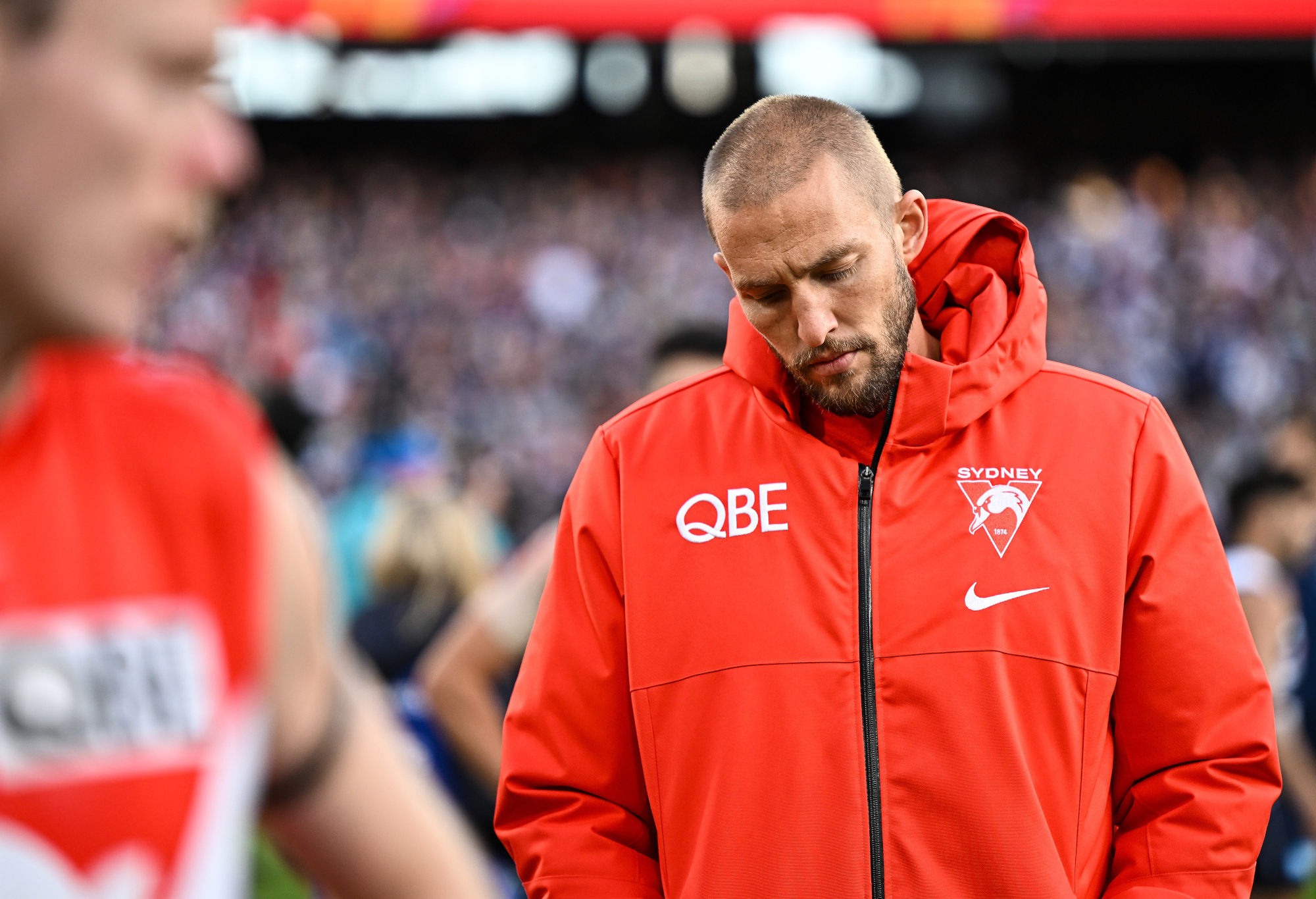
Sam Reid of the Swans. (Photo by Daniel Carson/AFL Photos via Getty Images)
3. Joel Selwood is a dirty, sniping, ducking… legend of our game
Look at any Tweet celebrating Joel Selwood’s achievement in the last fortnight, and chances are one of the responses will be a mud-sling trying to refute it.
He ducks for free kicks. He’s a sniper. He’s dirty. He’s actually not that good, just carried by other teams.
Aside from the last one, they’re all, to varying degrees, true. It would be rewriting history to say Selwood hasn’t led the way in players drawing high contact frees. He, more than anyone else, introduced the subtle shoulder shrug as one of footy’s dark arts, and now every club has a player or two who have followed suit.
Perhaps no modern player better embodies ‘white line fever’, either; a tremendous gentleman in every public interaction off the field, I’ve seen him target a pinned player’s eyes, choke-hold peroxide-blonde Collingwood goalsneaks, and get away with a smorgasbord of other little cheap shots. There’s 16 years worth of grudges to keep, and every team probably remembers an example or two where Selwood’s unmatched desire to win and to leave no stone unturned in its pursuit overstepped the mark.
The mistake, I believe, isn’t in acknowledging that Selwood has flaws – it’s in thinking these flaws in any way diminish his standing as a titan of our sport.
The good doesn’t wholly wash out the bad, but neither does the bad come even close to muddying the waters of everything Selwood has achieved, and stood for, in one of the great careers.
His last-quarter goal to put the cherry on top of the Cats’ premiership win, his impeccable conduct after the game, the emotions of both himself and Tom Hawkins at finding themselves back on the mountaintop at last, and he and wife Brit’s mid-week announcement of her pregnancy, gives Selwood the chance to walk away from the game on the highest high any footballer has ever experienced in our game.
But I don’t think for one minute that’s it for the number 14. Because that’s simply too self-serving for a man whose mission in life seems to be to squeeze every last drop out of himself until he can give no more.
Joel Selwood has set standards at Geelong almost from the moment he walked in the door, as a highly talented junior with suspect shoulders but a work rate destined for success.
His status as a great of the game was already well and truly secured, but his first premiership as captain now all but confirms Legend status in the AFL Hall of Fame once he hangs up the boots. Having long been bandied around as one of the game’s best leaders, he now has the accolade to officially have his name in the conversation.
Selwood is now a four-time premiership player. He’s been named in six All-Australian teams – three of them as captain. He holds the VFL/AFL record for most games as skipper, holds his club record for most games period, and has now gone past Michael Tuck’s long-standing benchmark for most finals, his haul now standing at 41. (To compare, St Kilda have only played 54 grand finals in 125 years.)
Four times has he been named by his peers as the AFL’s most courageous player, and the sight of him with at least part of his face taped up to stem the bleeding from his latest wound is perhaps the most iconic image of his career.
His winning record approaches 75 per cent, across more than 350 games (he’s still yet to chalk up his 100th loss).
More than any of that, he’s been the defining player of one of the greatest teams of all time. Like Dustin Martin for Richmond, or Luke Hodge for Hawthorn, Michael Voss for Brisbane or Gordon Coventry for the Collingwood ‘Machine’, he is the man who embodies every reason why this Cats team has been so good for so long.
Say what you will about him on-field, but there aren’t many players who would gift their grand final boots to an Auskicker, and make his first priority in what should be a moment to bask in premiership glory ensuring a young kid has the time of his life.
Has Joel Selwood been a dirty player over his career? Well, yeah. Has he won the odd dodgy free kick? Yes, that too. Are there moments across the journey where he hasn’t acted perfectly? You betcha.
But does that make a damn bit of difference to his legacy? Not on your life.
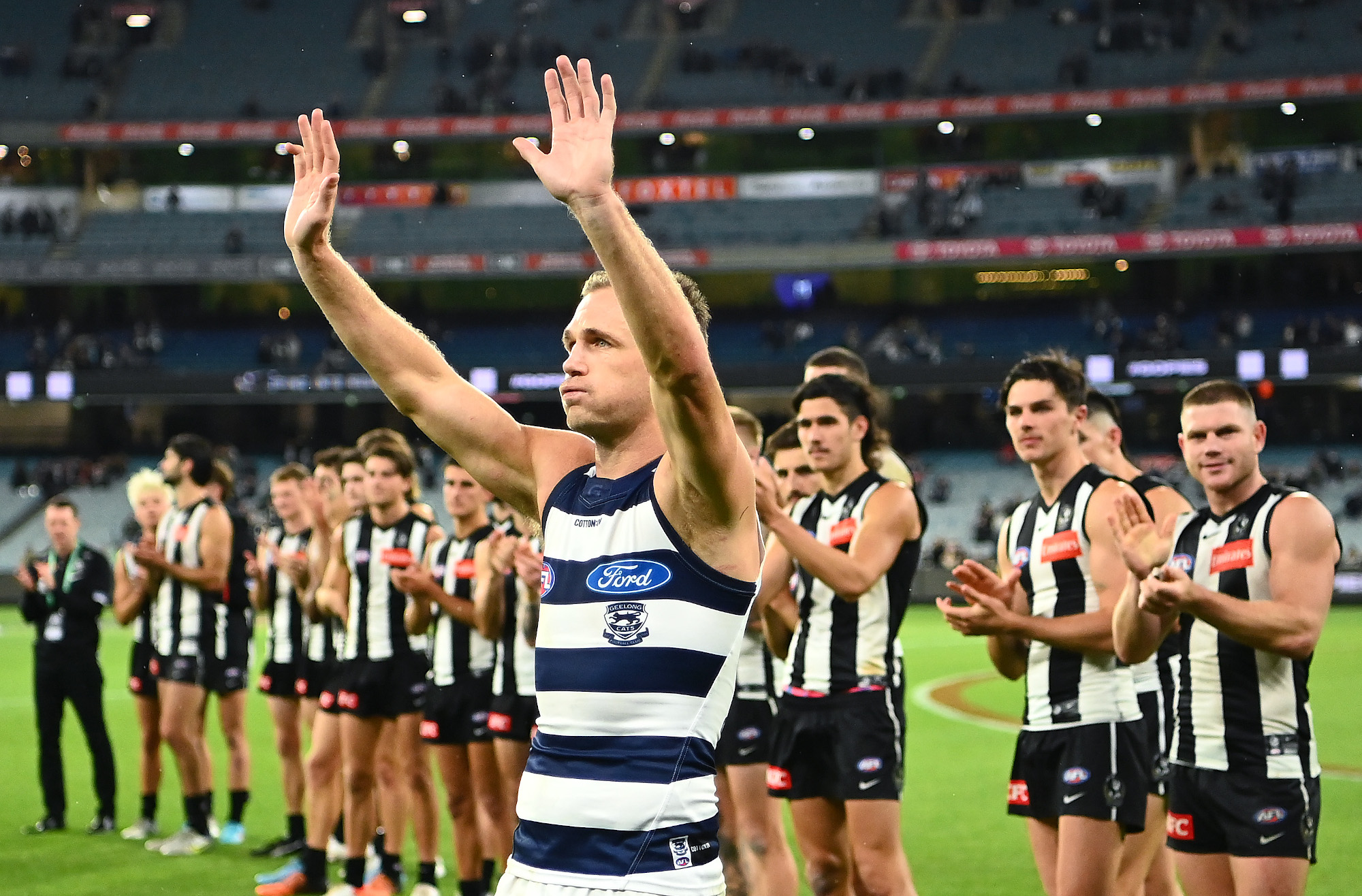
Joel Selwood is cheered off the ground after his 227th game as captain. (Photo by Quinn Rooney/Getty Images)
4. 2022 might have been the Pies’ best shot. And that’s okay
No sooner had Collingwood’s remarkable 2022 season come to a close with a heartbreaking preliminary final loss to Sydney, then the negative Nellies began to emerge.
“I think this was their year – this was the fairytale year that might have been their chance to go all the way,” said Leigh Montagna on Fox Footy
“There’s no guarantees they’ll get back to a prelim. This was their opportunity, they’ve just let it slip.”
On the surface, it’s easy to agree. History says the Magpies just won’t be able to ride their luck as they did in 2022, with 11 victories of 12 points or fewer – including nine of their 11 straight wins between Rounds 11 and 21. Indeed, their two heartbreakingly close finals losses to the eventual grand finalists suggests they’re already starting to revert back to the mean in close games.
They’ll probably end up with a harder draw, too, courtesy of their top-four finish. The Pies played Adelaide, Carlton, Essendon, Melbourne and Gold Coast twice in 2022 – with only one eventual finalist in those double-ups. If that becomes Geelong, or Sydney, or Brisbane, then things start to get tougher.
It only takes a few things going wrong to cut 16 wins, and a top-four berth, back to 12 wins and battling simply to make the eight. You only need look at the Western Bulldogs this year to see how that can pan out.
But that sort of fatalist talk by Montagna and others implies that a premiership is the be all and end all of footy. And I’m not convinced that’s the case.
The Pies might not have finished the year with the cup held aloft, but make no mistake, no supporter is going to forget the season anytime soon. It might well be the most extraordinary single year one club has ever had.
Those fans have seen wins after the siren, blockbuster heroics, unlikely resurrections, comeback after comeback, and all the while playing the most fearless, exhilarating, damn-the-consequences footy.
It’s been glorious enough to make even the most ardent Collingwood-haters tune in to watch them play week after week.
This might prove the Pies’ high water mark, or it might not. Either way, the future shouldn’t be what decides whether this incredible season under Craig McRae has any value.
There was no pot of gold at the end of the rainbow for Collingwood this year. But sometimes it’s about the journey more than the destination; and in 2022, that was simply unforgettable for anyone who bleeds black and white.
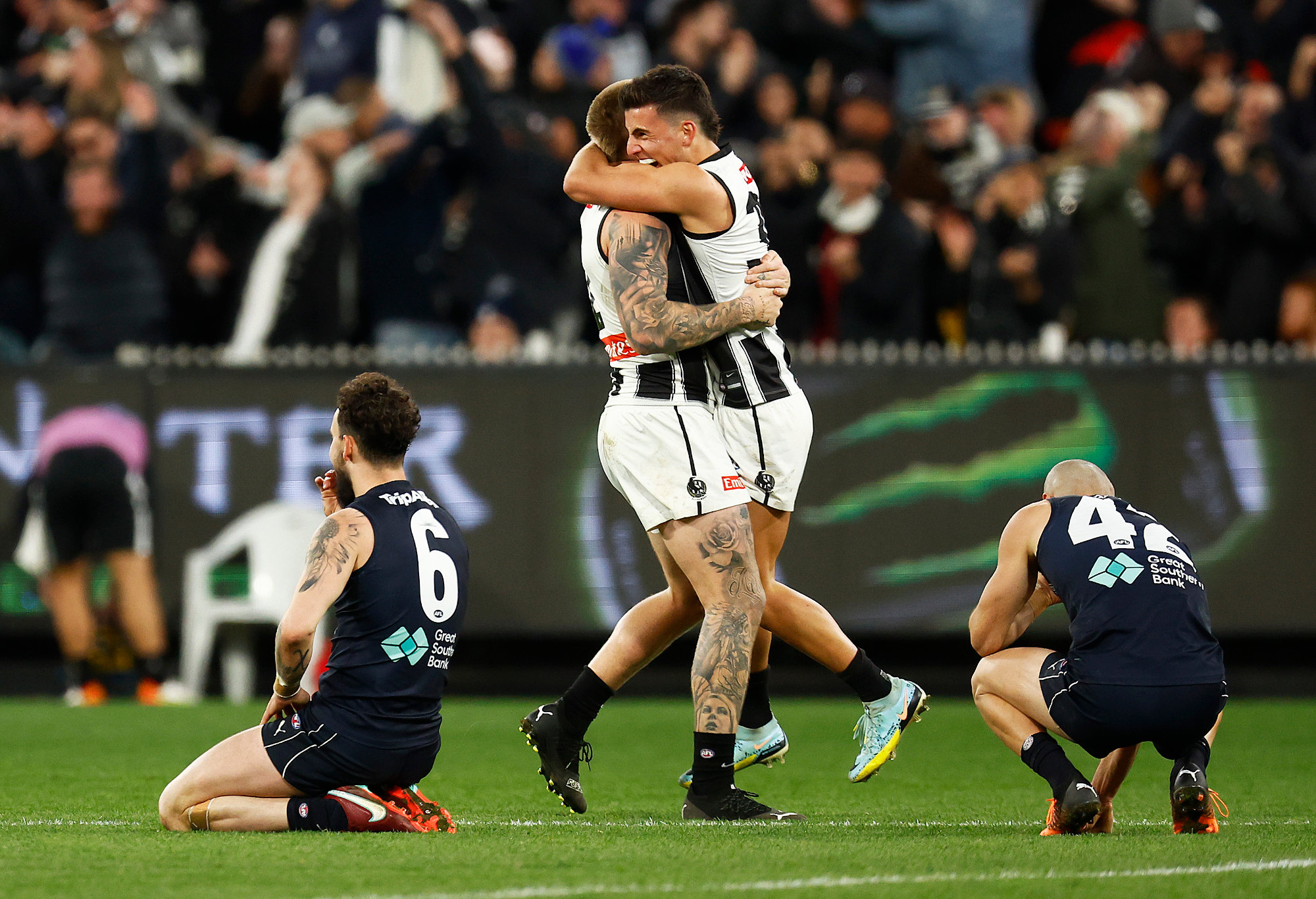
Zac Williams and Adam Saad of the Blues look dejected as Jordan De Goey and Nick Daicos of the Magpies celebrate. (Photo by Daniel Pockett/Getty Images)
5. Melbourne can – and should – bounce back in 2023
Barring something unforeseen, Geelong will probably be premiership favourites for the start of next season. And deservedly so.
But the thing about premierships is that they’re ultra-hard to defend – the Cats, having fumbled the chance to go back-to-back in both 2008 and 2010, know that better than most. Keeping the hunger alive, improving enough to remain ahead of a competition that has spent the summer planning your demise, and ensuring good enough fortune with injuries and form to prevent disaster striking at a bad time are all fiendishly difficult to accomplish for even the best of teams.
That’s why my extremely early 2023 flag tip isn’t Geelong; but rather, Melbourne.
The Dees showed all the signs in 2022 of a team laden with talent, but without the extra edge in intensity that transforms a team from good to flag-winning great.
They struggled to apply pressure, particularly in attacking 50; Christian Petracca couldn’t influence games to quite the same degree; Max Gawn played hurt; Steven May punched teammates in bars.
The result was a humiliating straight-sets finals exit, and a summer of soul-searching.
The Demons were still, despite only ever putting their best footy together in patches, powerful enough to finish the home-and-away season second. In both their losing finals – and nearly every home-and-away defeat, too – the Dees had full control of the match, only to let it slip through their fingers again and again.
I’m expecting a Demons team still laden with talent aplenty to come out in Round 1 of 2023 chastened by their 2022 experience, assured that talent can’t get them where they want to know without application, intensity and a refueled desire, and look to re-establish their legacy in the manner of the Cats in 2009 or Richmond in 2019.
On paper, they’re still the most exceptionally talented team in the competition, particularly in midfield, and the loss of Luke Jackson can be covered (though I’m far from convinced Brodie Grundy is the answer).
Only time will tell whether they can beat the Cats, or indeed whether the Cats can remain atop their perch having claimed the premiership that has so long eluded them.
But I’ve maintained all year that Melbourne’s best footy is the best footy. If the manner of their exit in 2022 has hit them as hard as it should, then I fully expect them to provide a whole lot more of it next season.
6. Is there a solution to the AFL’s racism problem?
I started this column by urging the AFL to acknowledge its racism problem, so it’s only fair that I proffer a solution.
One only needs look at Tyson Stengle’s impact since arriving at Geelong, confirmed spectacularly with four goals in a crushing grand final win, to appreciate how precious a First Nations presence in the game is.
We’ll probably never know the full extent of how much Stengle’s 2022 form is owed to Eddie Betts’ role as a development coach-slash-mentor; but it can’t be a coincidence that a player who was deemed too much trouble for Adelaide just 18 months ago has turned not just his footy career, but his life, around in spectacular style has been working so closely with Betts all season.
Yet as I pointed out in my Round 20 Six Points, Betts is one of very few First Nations coaches plying their trade in the AFL. For a sport that has long had a far higher-than-average Indigenous population among players, there’s an alarming dearth of the same representation when it comes to positions of power within clubs.
Surely, in light of the recent allegations of racism within the Hawthorn Football Club, it’s time for the AFL to take steps in ensuring every team has some form of First Nations presence within its coaching ranks.
Who knows whether the presence of an Indigenous coach at the Hawks would have had any impact in stopping the alleged horrific allegations against Alastair Clarkson or Chris Fagan, or whether it might have compelled an Indigenous player who felt exploited, vilified or abused to come forward sooner: but to quote Ned Flanders’ mother, the AFL right now have tried nothing and they’re all out of my ideas.
Granted, there simply might not be enough former Indigenous players willing and able to coach at the highest level. So my proposition would be to set a quota in place for at least one First Nations member of each team’s coaching staff… but defer it to the start of 2030.
Seven years is surely enough time for teams to set up coaching pathways for Indigenous players with a passion to stay involved in the game; to identify players whose knowledge and expertise can, like Betts at the Cats, make a substantial impact.
The same should apply to the AFL as well: there simply must be an Indigenous presence in both the league’s executive team and its board. Otherwise, how can it claim to be looking after the best interests of the game and its people?
Our game is made all the richer, more exciting, and infinitely better by its Indigenous presence.
It’s about time the league did something to try and stop the numbers of them being, as it was for Adam Goodes and Cyril Rioli, lost to the game once their playing careers are done.
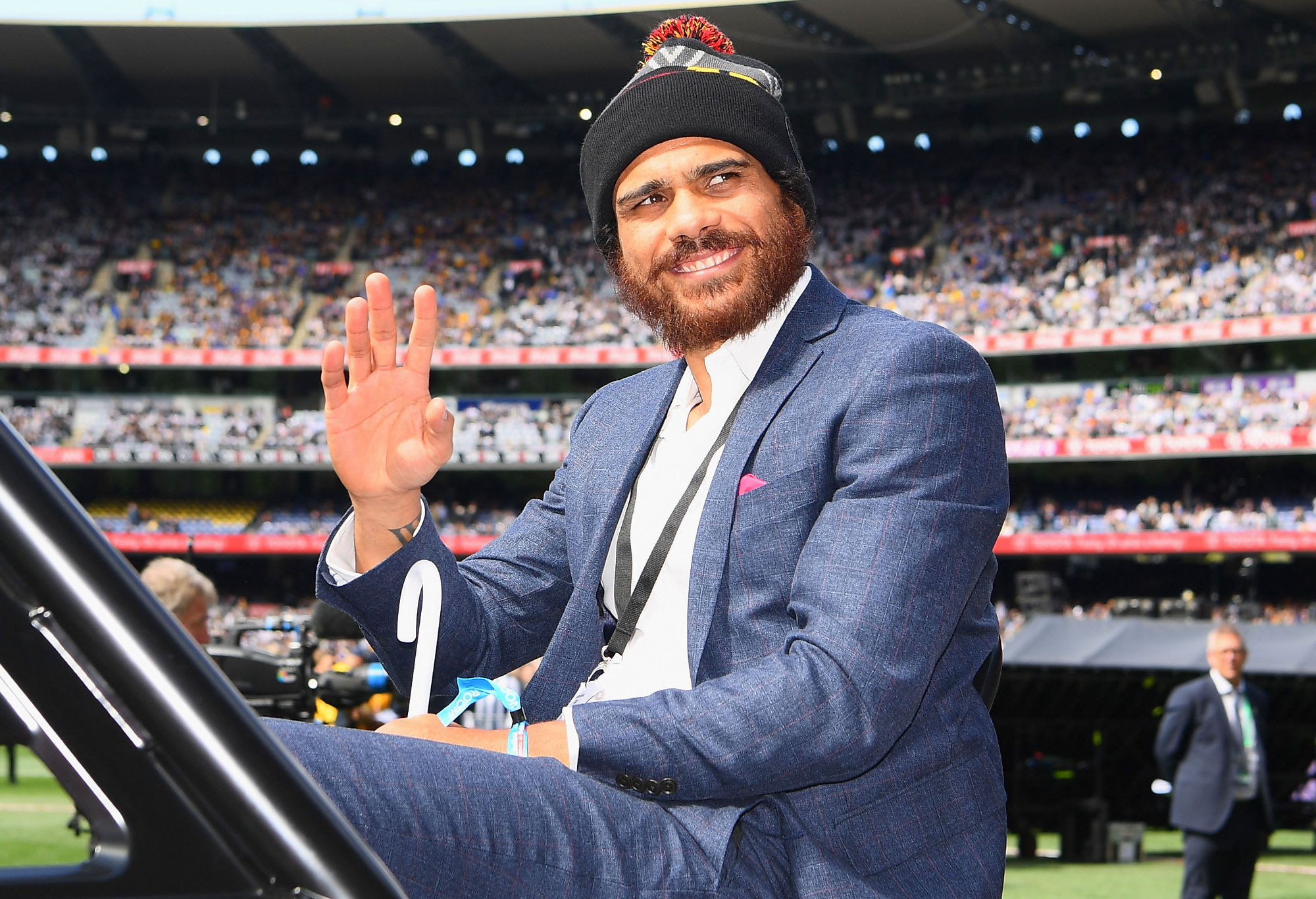
Cyril Rioli waves to the crowd during the 2018 AFL Grand Final match between the Collingwood Magpies and the West Coast Eagles at Melbourne Cricket Ground on September 29, 2018 in Melbourne, Australia. (Photo by Quinn Rooney/Getty Images)
Random thoughts
– Gary Rohan having 7 touches and going goalless in another grand final just makes it even funnier that he ripped Collingwood to shreds in week one.
– Dan Andrews claiming that Victorians would get behind another Vic team winning the flag rather than wanting it as far away as possible should frankly be an election-loser.
– Not sure how Tom Stewart has managed to make braining Dion Prestia the second-worst thing he’s done this year.
– Well played, Geelong.
– Jeremy Cameron sprinting from 30 metres away to have Patrick Dangerfield hand him an absolute charity goal in the last is as piss funny as it gets.
– Day grand final craps all over night grand final and I won’t hear a damn word otherwise.


































































































